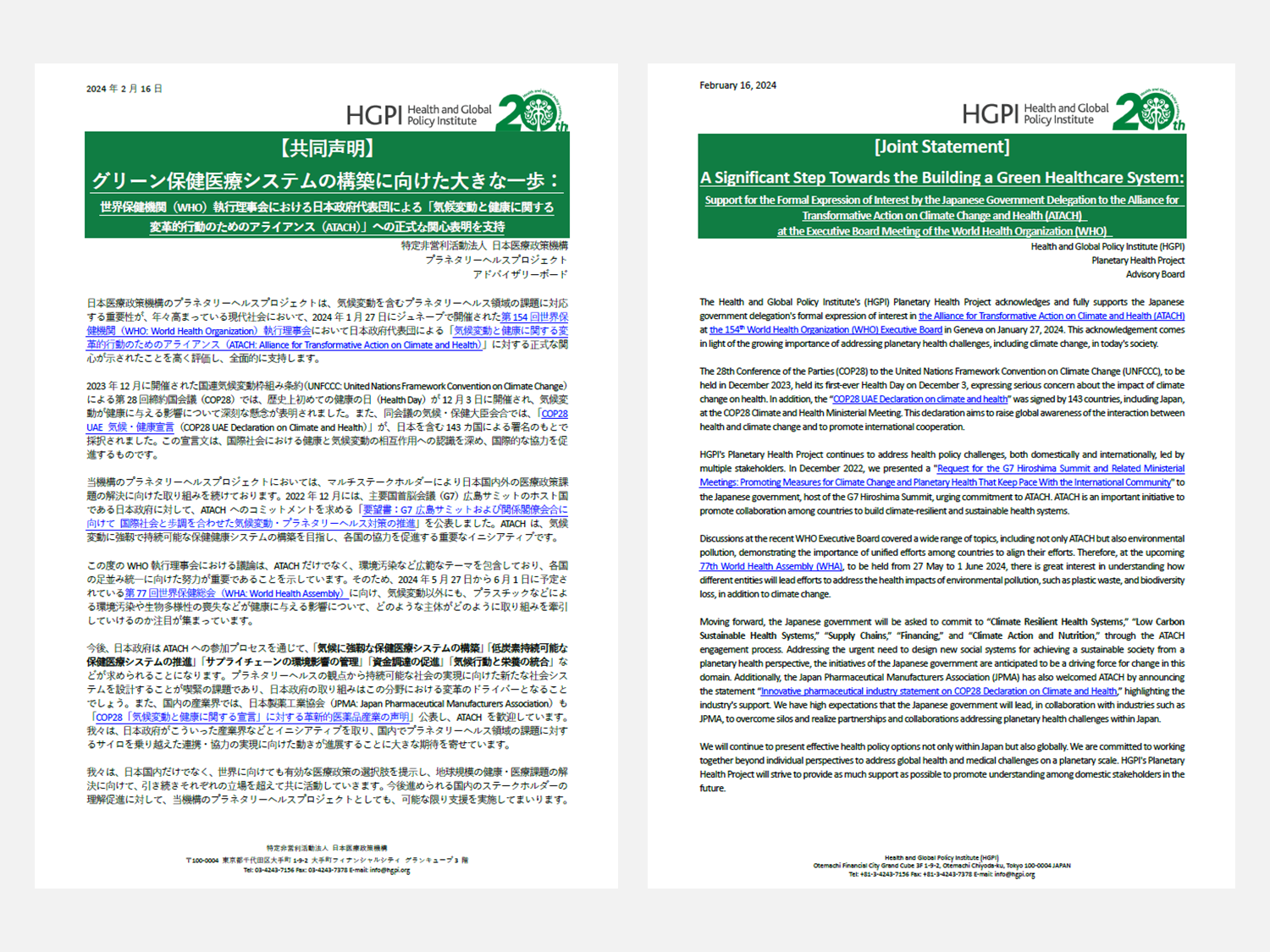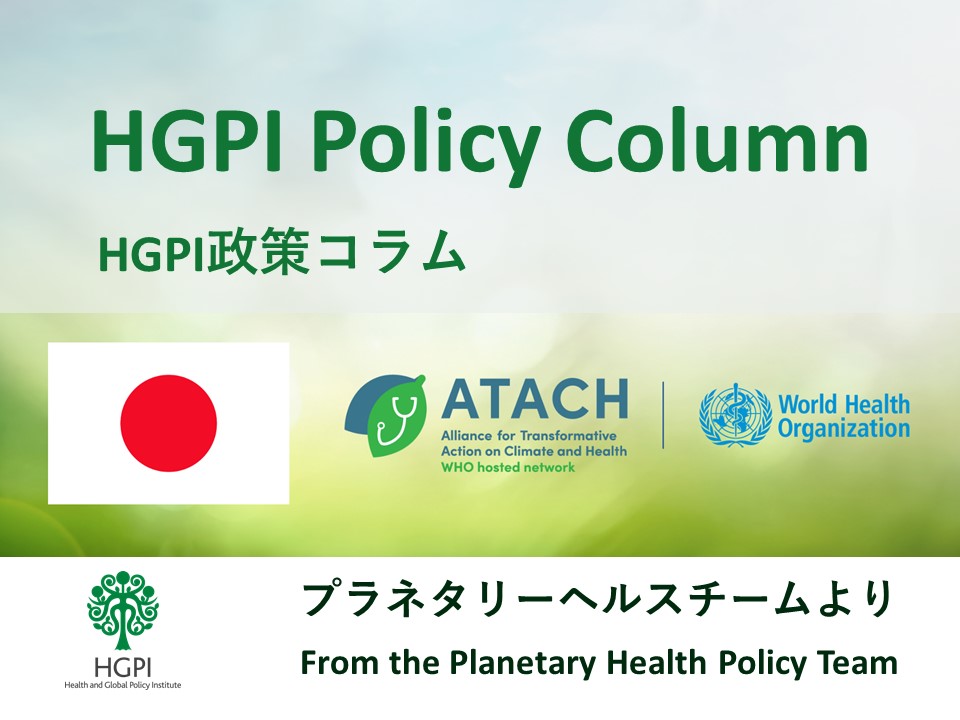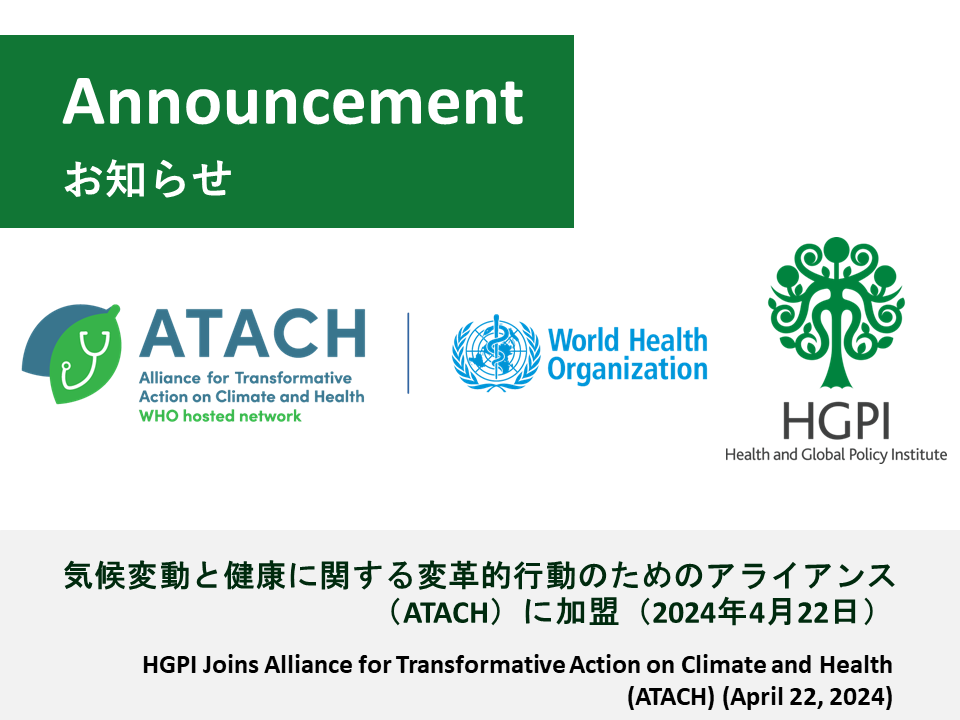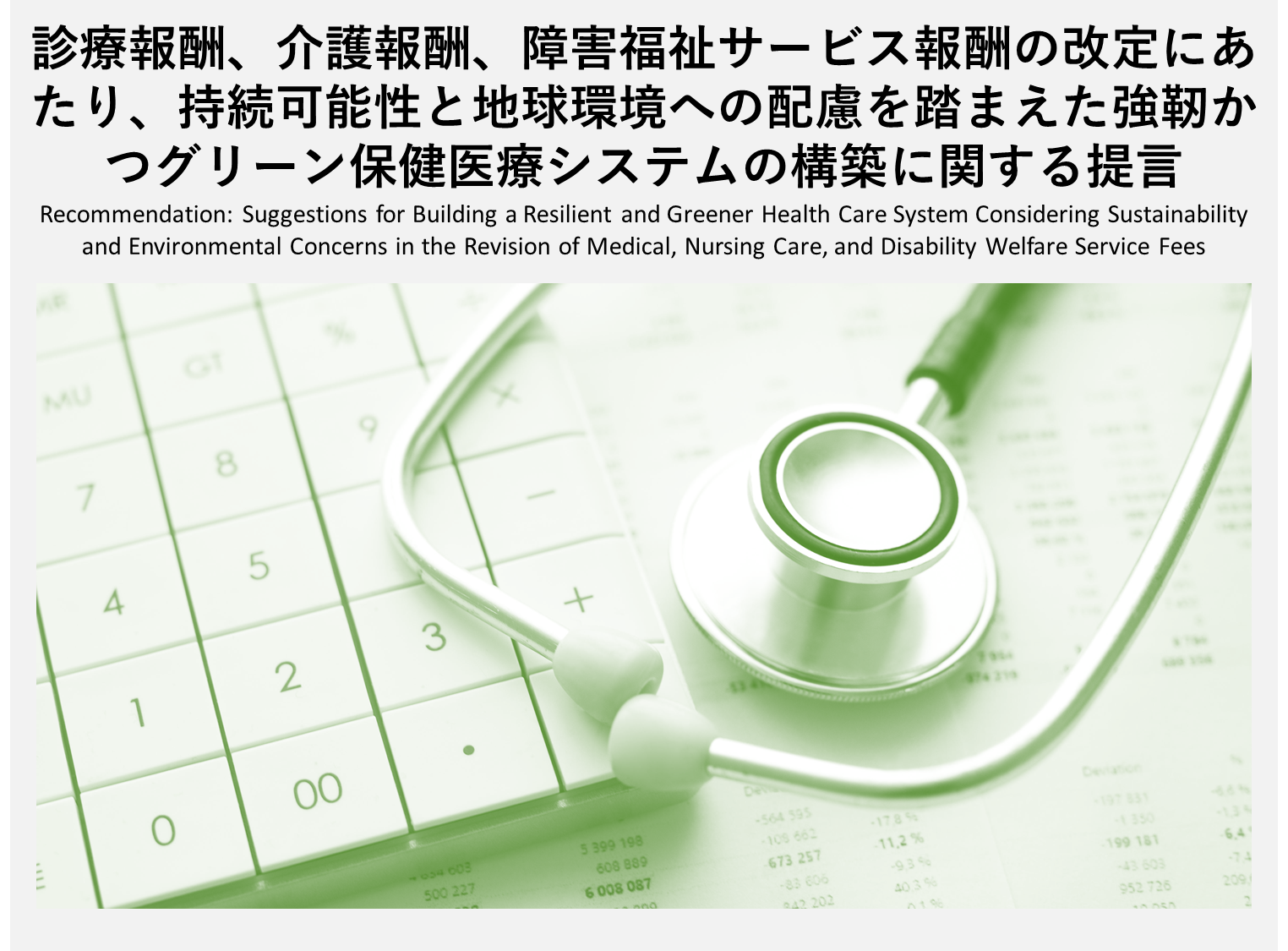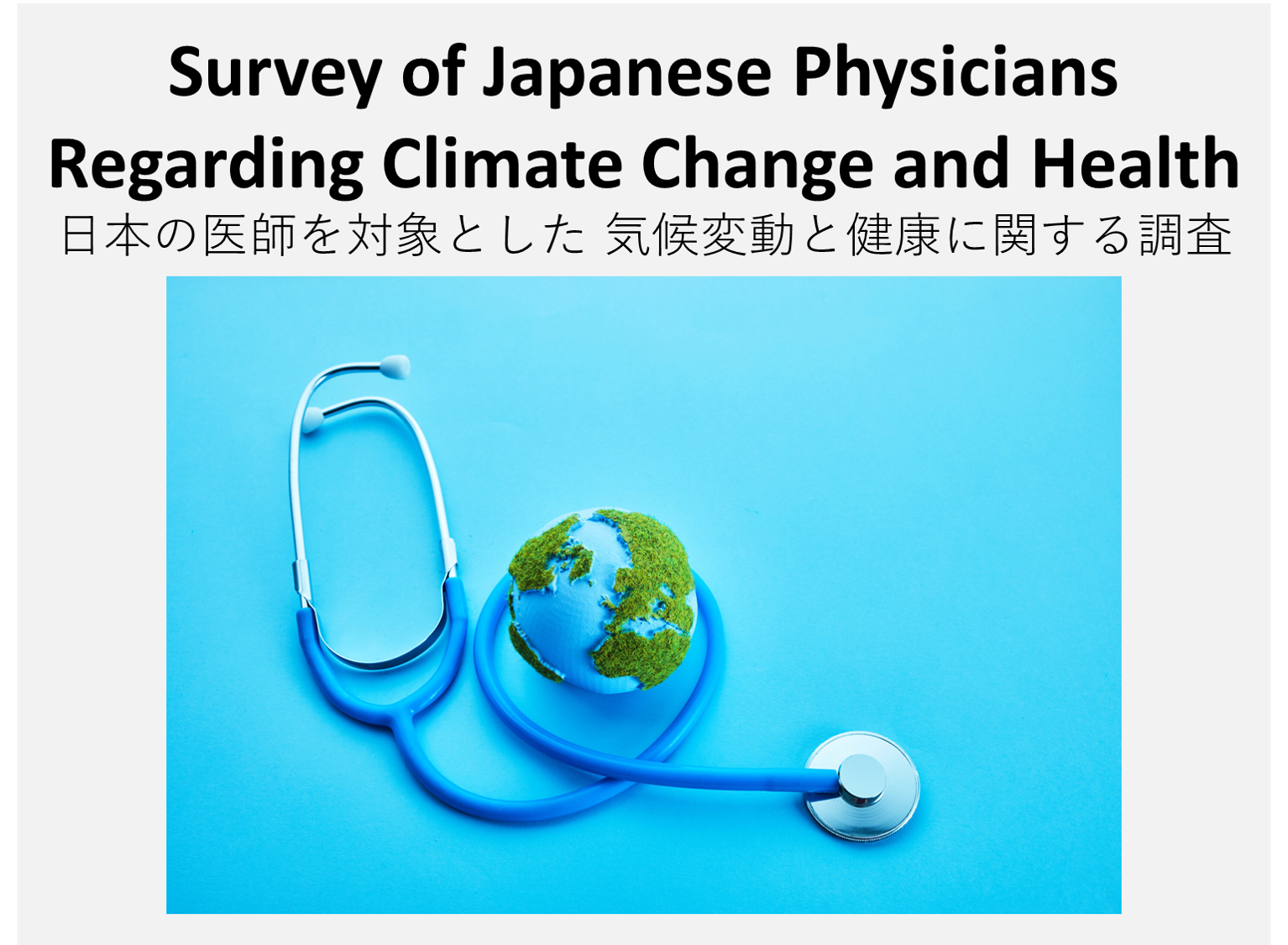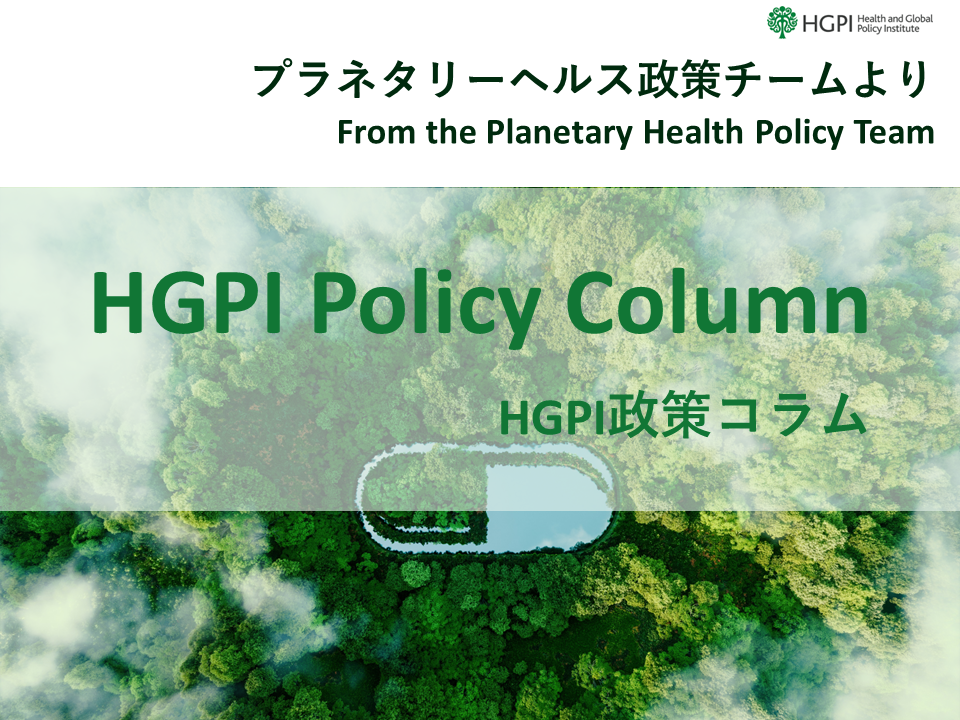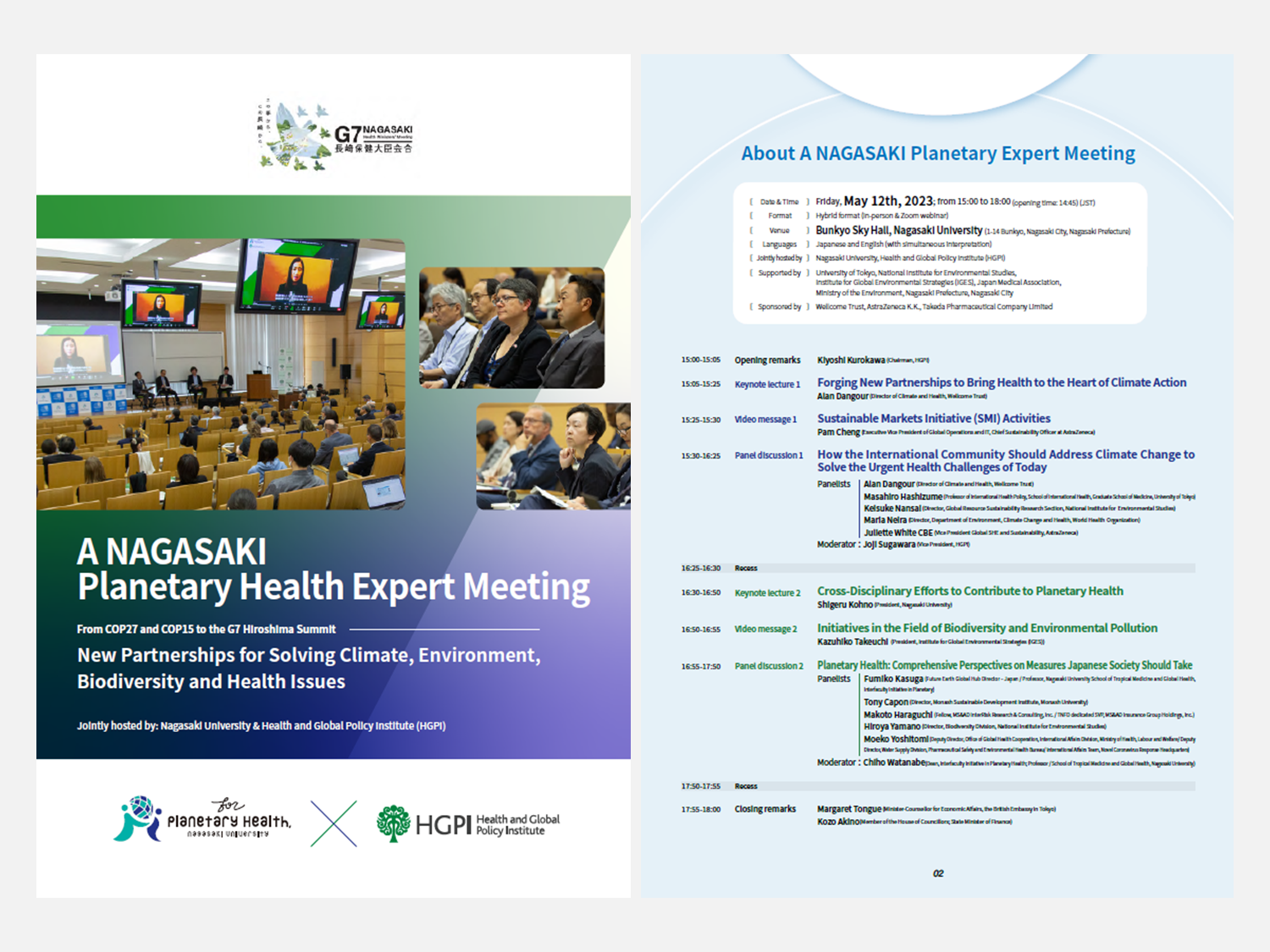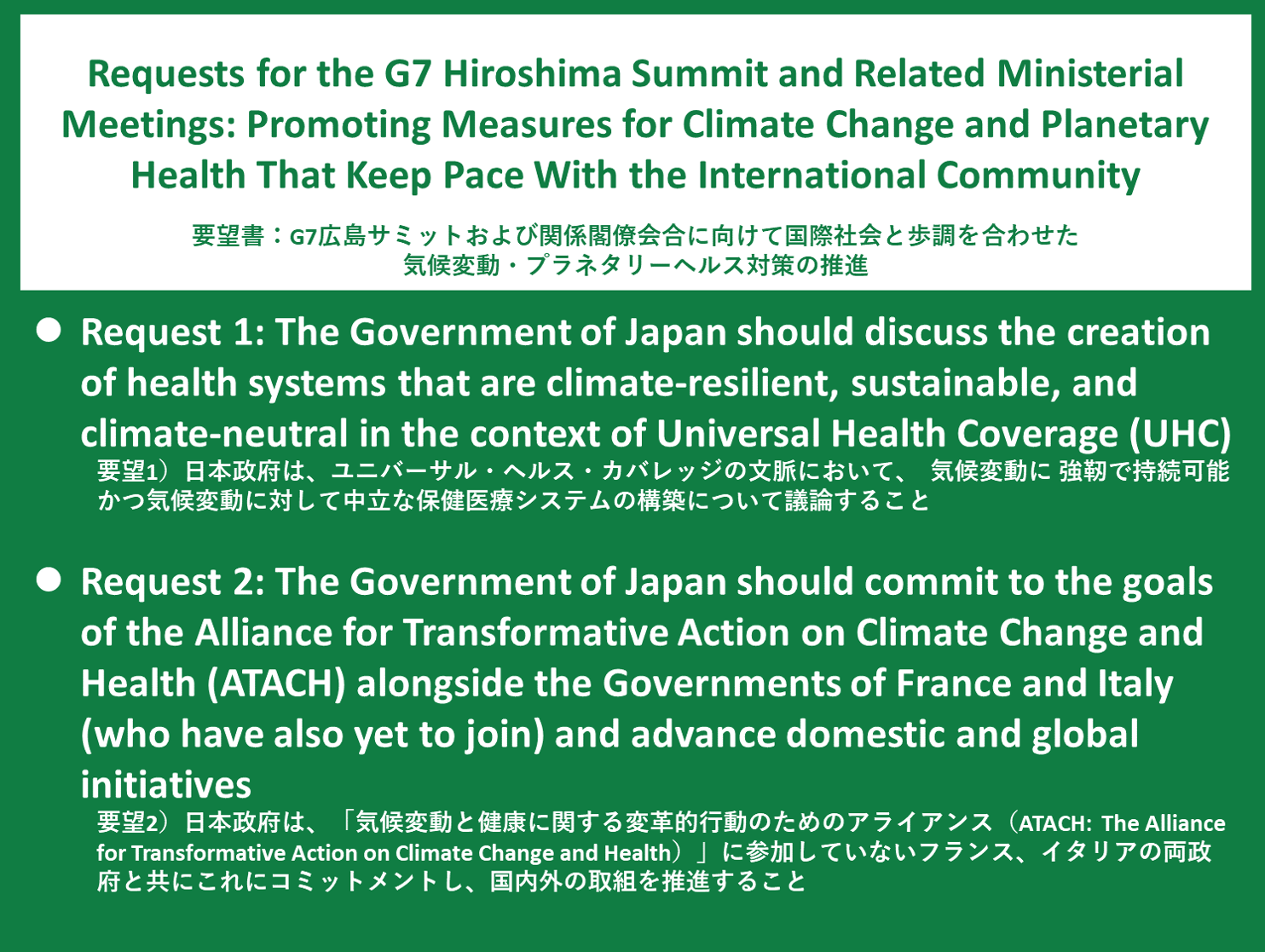[Announcement] A Turning Point Towards Building Green Healthcare Systems (June 5, 2024)
date : 6/5/2024
Tags: Planetary Health
![[Announcement] A Turning Point Towards Building Green Healthcare Systems (June 5, 2024)](https://hgpi.org/en/wp-content/uploads/sites/2/ATACH_ENG_GoJ.png)
Health and Global Policy Institute’s Planetary Health Project and Advisory Board Members and Supporters welcome and fully support the Japanese government’s announcement at the 77th World Health Assembly (WHA) on May 28, 2024, of its formal expression of interest to join the Alliance for Transformative Action on Climate and Health (ATACH). This significant decision demonstrates Japan’s strong commitment to addressing the health impacts of climate change and contributing to the international effort to build sustainable and resilient healthcare systems.
Climate change is one of the greatest health threats of our time, with its effects already manifesting in many regions. To tackle the diverse health risks posed by climate change, such as extreme weather events, rising temperatures, and the spread of infectious diseases, international cooperation and collective action are essential. By joining ATACH, Japan aims to share solutions and strengthen the foundation for effective measures with the 83 participating countries and other nations.
At the 28th Conference of the Parties (COP28) to the United Nations Framework Convention on Climate Change (UNFCCC) held in December 2023, the first-ever “Health Day” was established, expressing serious concern about the impact of climate change on health. During this event, the “COP28 UAE Climate and Health Declaration” was adopted and signed by 143 countries, including Japan. This declaration aims to deepen the global community’s awareness of the interaction between health and climate change and to promote international cooperation.
The World Health Assembly (WHA) is the highest decision-making body of the World Health Organization (WHO), where representatives from 194 member countries gather annually in May to decide on the organization’s priorities and policies. At this WHA, the WHO’s Fourteenth General Programme of Work (GPW 14) for 2025-2028 was adopted. Climate change and health are among the six strategic objectives, with planetary health challenges expected to play a cross-sectoral role in advancing the Sustainable Development Goals (SDGs) by 2030, particularly in the wake of the global pandemic.
In Japan, discussions on plastic pollution, the “GX2040 Vision,” the “Basic Energy Plan,” and the “Global Warming Countermeasure Plan” have been advanced under the “Osaka Blue Ocean Vision” adopted at the G20 Osaka Summit in 2019 and the goal of achieving carbon neutrality by 2050. Additionally, the revised SDGs Implementation Plan in December 2023 emphasized the importance of considering the interconnectedness of global challenges, reflecting the concept of planetary health. Furthermore, the Basic Environment Plan approved by the Cabinet in May 2024 identified the period up to around 2030 as the “decisive decade” with choices that will impact millennia. The concept of planetary health was highlighted, suggesting that participation in ATACH is expected to catalyze cross-sectoral and cross-organizational efforts involving the Ministry of Health, Labour and Welfare, the Ministry of the Environment, the Ministry of Economy, Trade and Industry, the Ministry of Land, Infrastructure, Transport and Tourism, and the Ministry of Agriculture, Forestry and Fisheries.
HGPI’s Planetary Health Project promotes multi-stakeholder cooperation to address health policy challenges both domestically and internationally. In December 2022, we released a request to the Japanese government urging commitment to ATACH for the G7 Hiroshima Summit. As highlighted in that request, we believe the Japanese government’s recent decision will accelerate climate and health initiatives both domestically and internationally.
Through participation in ATACH, the Japanese government is expected to strengthen the following initiatives:
- Building climate-resilient healthcare systems:
- Conducting Vulnerability & Adaptation Assessments (V&A)
- Developing and publishing Health National Adaptation Plans (HNAP)
- Promoting access to climate financing using V&A and HNAP
- Promoting sustainable low-carbon healthcare systems:
- Conducting baseline assessments of healthcare system greenhouse gas emissions
- Developing action plans or roadmaps for low-carbon sustainable healthcare systems
- Implementing measures to reduce greenhouse gas emissions and waste
- Comprehensive response to the interaction between climate change and health:
- Addressing mental health, psychosocial well-being, loss of traditional medicinal knowledge, livelihoods and culture, and displacement due to climate change
- Enhancing the healthcare system’s capacity to respond to climate-sensitive diseases and health risks
- Strengthening climate-health information services, surveillance, early warning, and response systems
- Enhancing research and cooperation on health and climate change:
- Promoting cooperation on health issues related to humans, animals, the environment, and climate
- Implementing the One Health approach and addressing environmental determinants
- Early detection of zoonotic diseases for pandemic prevention, preparedness, and response
- Promoting financing and international cooperation:
- Expanding investments in climate and health from domestic budgets, multilateral development banks, multilateral climate funds, health financing institutions, philanthropic organizations, bilateral development agencies, and the private sector
- Strengthening monitoring, transparency, and evaluation of climate finance
Additionally, addressing other planetary health challenges besides climate change is expected to involve the following:
- Responding to the health impacts of chemicals, waste, and pollution:
- Promoting evaluations by international organizations of the health impacts of chemicals, waste, and pollution, particularly risks from hazardous substances like lead, mercury, and pesticides
- Establishing a scientific policy panel to support the sound management of chemicals and waste and developing legally binding measures for plastic pollution, including in the marine environment
- Ensuring a sustainable environment for health:
- Promoting integrated and coordinated actions to address climate change, environmental pollution, biodiversity loss, and all forms of malnutrition
- Implementing adaptive actions across sectors such as food and agriculture, water and sanitation, housing, urban planning, healthcare, transportation, and energy
- Accelerating the achievement of the Sustainable Development Goals (SDGs):
- Promoting policies to overcome health inequalities and achieve SDG 3, which focuses on health and well-being for all
- Reducing poverty and hunger, improving health and livelihoods, enhancing social protection systems, ensuring food security and nutrition, providing clean energy sources, access to safe drinking water, sanitation, and hygiene, and achieving universal health coverage (UHC)
- Reducing waste in the healthcare sector:
- Promoting the development of procurement standards for national healthcare systems, including supply chains, to reduce waste in the healthcare sector
- Enhancing synergies between policy and practice:
- Strengthening monitoring of progress in the climate-health nexus, sharing best practices, conducting cross-sectoral and interdisciplinary research, and enhancing inter-sectoral cooperation
HGPI’s Planetary Health Project, along with its advisory board members, will continue to support the Japanese government’s efforts and work together to address global health and medical challenges on a planetary scale. Many activities supporting the Japanese government’s initiatives are already being carried out across various sectors within Japan.
The Japan Pharmaceutical Manufacturers Association and the Federation of Pharmaceutical Manufacturers’ Associations of Japan have already issued the “Innovative pharmaceutical industry statement on COP28 Declaration on Climate and Health,” welcoming ATACH and advancing carbon neutrality action plans and targets, thereby strengthening efforts to promote sustainable low-carbon healthcare systems.
Furthermore, the Japanese Association of Medical Sciences, which includes over 100 member societies with a combined membership of over 1 million, published the “Recommendations for the Future” in March 2023, declaring efforts to address global health challenges, including climate change. The recent Japanese government’s participation in ATACH is anticipated to lead to discussions and concrete actions in each specialized field, similar to other major developed countries’ academic societies. Particularly, the “Declaration of Climate Emergency in Primary Care (Hamamatsu Declaration)” published by the Japan Primary Care Association in May 2024 is expected to play an important role in advancing this trend domestically.
Additionally, the Japan Medical Association has been actively engaged in efforts to protect the health of the planet and humanity, including the “JMA Declaration on the Environment” in 2009 and participation in “Deco-Katsu,” a national movement led by the Ministry of the Environment to create a new, prosperous lifestyle that leads to decarbonization.
Finally, our organization, as a member of ATACH, along with health ministries from over 81 countries, including Japan, and more than 30 partners, intends to play a role in the five working groups: 1. Financing Working Group (FIN-WG), 2. Climate Resilient Health Systems Working Group (CRHS-WG), 3. Low Carbon Sustainable Health Systems Working Group (LCSHS-WG), 4. Supply Chain Working Group (SC-WG), and 5. Climate Action and Nutrition Working Group (I-CAN-WG).
Top Research & Recommendations Posts
- [Policy Recommendations] The Path to a Sustainable Healthcare System: Three Key Objectives for Public Deliberation (January 22, 2026)
- [Research Report] Perceptions, Knowledge, Actions and Perspectives of Healthcare Organizations in Japan in Relation to Climate Change and Health: A Cross-Sectional Study (November 13, 2025)
- [Research Report] The 2025 Public Opinion Survey on Healthcare in Japan (March 17, 2025)
- [Policy Recommendations] Reshaping Japan’s Immunization Policy for Life Course Coverage and Vaccine Equity: Challenges and Prospects for an Era of Prevention and Health Promotion (April 25, 2025)
- [Research Report] The 2023 Public Opinion Survey on Satisfaction in Healthcare in Japan and Healthcare Applications of Generative AI (January 11, 2024)
- [Research Report] AMR Policy Update #4: Cancer Care and AMR (Part 1)
- [Policy Recommendations] Developing a National Health and Climate Strategy for Japan (June 26, 2024)
- [Public Comment Submission] “Assessment Report on Climate Change Impacts in Japan (Draft Overview)” (December 24, 2025)
- [Research Report] Survey of Japanese Physicians Regarding Climate Change and Health (December 3, 2023)
- [Research Report] The Public Opinion Survey on Child-Rearing in Modern Japan (Final Report) (March 4, 2022)
Featured Posts
-
2026-01-09
[Registration Open] (Hybrid Format) Dementia Project FY2025 Initiative Concluding Symposium “The Future of Dementia Policy Surrounding Families and Others Who Care for People with Dementia” (March 9, 2026)
![[Registration Open] (Hybrid Format) Dementia Project FY2025 Initiative Concluding Symposium “The Future of Dementia Policy Surrounding Families and Others Who Care for People with Dementia” (March 9, 2026)](https://hgpi.org/en/wp-content/uploads/sites/2/dementia-20260309-top.png)
-
2026-02-05
[Registration Open] (Webinar) The 141st HGPI Seminar “Current Status and Future Prospects of Korea’s Obesity Policy: Voices of People with Lived Experience in Policy Promotion” (March 3, 2026)
![[Registration Open] (Webinar) The 141st HGPI Seminar “Current Status and Future Prospects of Korea’s Obesity Policy: Voices of People with Lived Experience in Policy Promotion” (March 3, 2026)](https://hgpi.org/en/wp-content/uploads/sites/2/hs141-top-1.png)
-
2026-02-06
[Research Report] AMR Policy Update #5: Cancer Care and AMR (Part 2)
![[Research Report] AMR Policy Update #5: Cancer Care and AMR (Part 2)](https://hgpi.org/en/wp-content/uploads/sites/2/HGPI_20260204_AMR-Policy-Update-5.png)




